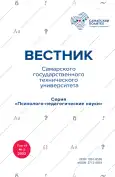Особенности представлений о межэтническом доверии представителей различных этнических групп поликультурного региона
- Авторы: Алборова А.В.1, Дреева С.В.1
-
Учреждения:
- Северо-Осетинский государственный педагогический институт (ГБОУ ВО СОГПИ)
- Выпуск: Том 19, № 2 (2022)
- Страницы: 113-126
- Раздел: Социальная психология
- URL: https://journal-vniispk.ru/1991-8569/article/view/105241
- DOI: https://doi.org/10.17673/vsgtu-pps.2022.2.8
- ID: 105241
Цитировать
Полный текст
Аннотация
В статье приведены результаты проведенного в 2021 году исследования представлений о доверии в межэтнических отношениях представителей различных этнических групп поликультурного региона. Цель исследования заключалась в рассмотрении компонентов доверия этнофоров, выявлении идей о факторах, влияющих на межэтническое доверие. В исследовании использовалась авторская методика для оценки структуры представлений о межэтническом доверии, факторов доверия, а также выявляющая самооценку способности доверять в межэтнических отношениях. Респондентам была предложена модификация методики «Незаконченные предложения» Сакса Леви в авторской модификации, отражающая понимание респондентами межэтнического аспекта доверия и степени доверительных отношений к отдельным этносам. При анализе особенностей представлений о межэтническом доверии была использована методическая разработка оценки структуры представлений о доверии М.М. Борисовой, С.Д. Гуриевой. В исследовании использовался t-критерий Стьюдента, для определения статистической значимости различий средних величин. Выборку составили 418 респондентов, представители этнических групп осетин, русских, чеченцев, кабардинцев, грузин, которые проживают на территории Северо-Кавказского Федерального Округа Российской Федерации (Республика Северная Осетия — Алания, Чеченская Республика и Кабардино-Балкарская Республика). В исследовании участвовали две возрастные группы: первая — респонденты от 16 до 25 лет; вторая — респонденты старше 25 лет. Результаты нашего исследования показали, что когнитивный компонент в структуре представлений о доверии преобладает по всей выборке испытуемых, независимо от возраста и этнической принадлежности. В качестве факторов, влияющих на межэтническое доверие, респондентами были обозначены: личностные качества этнофоров, особенности поведения, история взаимоотношений народов, социальное окружение, знания о других народах, государство, а также средства массовой информации.
Полный текст
Открыть статью на сайте журналаОб авторах
Алена Валериевна Алборова
Северо-Осетинский государственный педагогический институт (ГБОУ ВО СОГПИ)
Автор, ответственный за переписку.
Email: alborova-alena2012@yandex.ru
ORCID iD: 0000-0003-2251-9930
SPIN-код: 2280-9386
аспирант кафедры «Педагогика и психология»
Россия, ВладикавказСветлана Владимировна Дреева
Северо-Осетинский государственный педагогический институт (ГБОУ ВО СОГПИ)
Email: c.dreeva@mail.ru
ORCID iD: 0000-0002-7892-8429
кандидат психологических наук, доцент кафедры «Педагогика и психология»
Россия, ВладикавказСписок литературы
- Антоненко И.В. Социально-психологическая концепция доверия. – М.: Флинта; Наука, 2006. – 480 с.
- Кон И.С. Дружба: Этико-психологический очерк. – М.: Политиздат, 1987. – 350 с.
- Сафонов В.С. Особенности доверительного общения: автореф.т дисс. на соискание учен. степени канд. психол. наук. – М., 1977. – 247 с.
- Скрипкина Т.П. Психология доверия. – М.: Академия, 2000. – 264 с.
- Поршнев Б.Ф. Социальная психология и история. – М., 1966. – 213 c.
- Гуриева С.Д. Межэтнические отношения: этнический фактор в межэтнических отношениях // Вестник Северо-Восточного федерального университета им. М.К. Аммосова. – 2008. – № 4. – С. 79–83.
- Сидоренков А.В., Сидоренкова И.И. Доверие в малых группах // Вопросы психологии. – 2011. – № 1. – С. 94–105.
- Купрейченко А.Б. Психология доверия и недоверия. – М.: Институт психологии РАН, 2008. – 564 с.
- Алексеева А.Ю. Феномен личностного доверия в ситуации институционального займа: дисс. ... канд. социол. наук. – Новосибирск, 2007. – 127 с.
- Фукуяма Ф. Доверие: социальные добродетели и путь к процветанию. – М.: ООО «Издательство АСТ», 2004. – 730 с.
- Почебут Л.Г., Чикер В.А. Психология доверия в организациях // Психологический журнал. – 2017. – № 6. – С. 65–76.
- Почебут Л.Г. Взаимопонимание культур. Методология и методы этнической и кросс-культурной психологии. Психология межэтнической толерантности. – СПб.: Издательство Санкт-Петербургского университета, 2005. – 281 с.
- Мацумото Д. Человек. Психология. Культура. Удивительные загадки, исследования, открытия. – СПб.: Прайм-Еврознак, 2008. – 672 с.
- Аллахвердов М.В. Влияние имплицитной теории доверия на решение когнитивных задач: автореф. дисс. … канд. психол. наук: 19.00.01. – СПб., 2013. – 24 с.
- Борисова М.М. Социальные представления о доверии: дисс. … канд. психол. наук: 19.00.05. – СПб., 2018. – 219 с.
- Антоненко И.В. Социальная психология доверия // Приволжский научный вестник. – 2014. – № 11–2(39). – С. 99–104.
- Бодюль В.Е. Проблема доверия политическому лидеру // Проблема доверия в международных отношениях: теория и практика. – М.: РАГС, 2000. – С. 75–79.
- Гуриева С.Д., Борисова М.М. Социальные представления о доверии современной молодежи: кросскультурный анализ [Электронный ресурс] // Современные исследования социальных проблем. – 2016. – № 12(68). – 358 с.
- Гуриева С.Д., Борисова М.М. Доверие как социально-психологическое явление // Вестник Санкт-Петербургского университета. – 2014. – № 4. – С. 126–136.
- Купрейченко А.Б., Табхарова С.П. Критерии доверия и недоверия личности другим людям // Психологический журнал. – 2007. – № 2. – С. 17–25.
- Burt R.S., Knez M. Trust and thirdparty gossip // Kramer R.M. & Tyler T.R. Trust in Organizations. Thousand Oaks: SAGE Publications, 1996. – P. 68–89.
- Castaldo S. Meanings of Trust: a Meta-Analysis of Trust Definitions // Paper presented at Second Euram Conference. – Stockholm, 2002. – 7 p.
- Hawley K. Trust, Distrust and Commitment // University of St Andrews. – 2014. – Nous 48:1. – P. 1–20.
Дополнительные файлы











